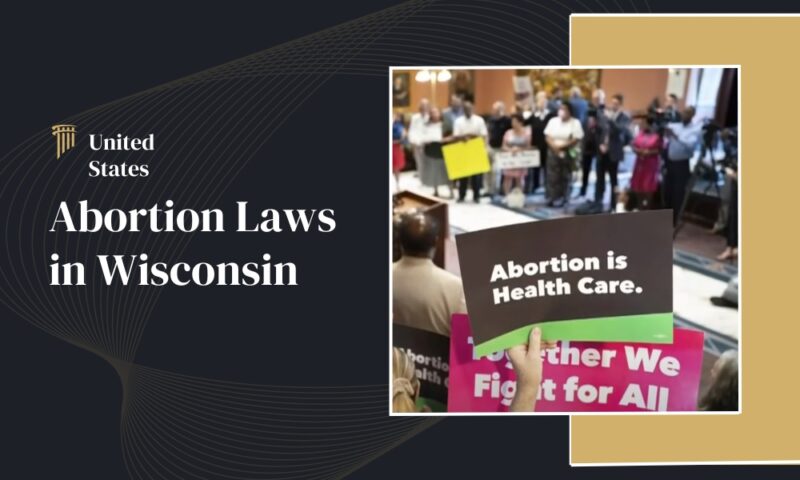Abortion laws vary significantly across different states in the United States, and understanding these laws can be a complex task. Today, we will provide an overview of the abortion laws in Wisconsin and help you get a broader picture of how they work and what they represent.
Historical Context
To get a better understanding of the present requires a look back at the past. Before Roe v. Wade, the landmark 1973 Supreme Court decision that federally recognized a woman’s right to choose, Wisconsin, like many other states, criminalized abortion except in cases where the mother’s life was at risk. These laws remained in effect for over a century until the Roe decision prompted a reconsideration of women’s reproductive rights at the state level.
Post-Roe, Wisconsin has had an evolving legal framework surrounding abortion. The state legislature passed several laws in an attempt to regulate the practice within the bounds of the federal mandate. These laws cover areas such as informed consent, parental involvement for minors seeking an abortion, mandatory ultrasounds, and more.
Abortion Laws in the United States

Before delving into the specifics of Wisconsin, it’s essential to understand the broader landscape of abortion laws in the United States. As of June 1, 2023, 43 states prohibit abortions after a specified point in pregnancy, with some exceptions provided. Additionally, recent events such as the Chicago abortion protest have further fueled the nationwide debate on reproductive rights.
These exceptions are generally when an abortion is necessary to protect the patient’s life or health. Additionally, 32 states require it to be performed by a licensed physician, and 20 states require an abortion to be performed in a hospital after a specified point in the pregnancy.
Abortion Laws in Wisconsin
Physician and Hospital Requirements
In Wisconsin, as in 31 other states, an abortion must be performed by a licensed physician. After a certain point in the pregnancy, specifically after viability, the procedure must be performed in a hospital. This is a requirement shared by 19 other states.
Gestational Limits and “Partial-Birth” Abortion
As we have previously mentioned, Wisconsin is one of the 43 states that prohibit abortions after a specified point in pregnancy, with some exceptions provided. The allowable circumstances are generally when it is necessary to protect the patient’s life or health. Additionally, Wisconsin is one of the 21 states that have laws in effect prohibiting “partial-birth” abortion.
Public Funding and Private Insurance Coverage

In terms of public funding, Wisconsin is one of the 33 states and the District of Columbia that prohibit the use of state funds except in those cases when federal funds are available: where the patient’s life is in danger or the pregnancy is the result of rape or incest.
Regarding private insurance, Wisconsin is one of the 12 states that restrict coverage of abortion in private insurance plans, most often limiting coverage only to when the patient’s life would be endangered if the pregnancy were carried to term.
Refusal and State-Mandated Counseling
Wisconsin allows individual healthcare providers and institutions to refuse to participate in an abortion. It is one of the 45 states that allow individual healthcare providers to refuse to participate in it and one of the 42 states that allow institutions to refuse to perform them.
Furthermore, Wisconsin is one of the 17 states that mandate individuals be given counseling before an abortion that includes information on at least one of the following: the purported link between abortion and breast cancer, the ability of a fetus to feel pain or long-term mental health consequences for the patient.
Waiting Periods and Parental Involvement
Wisconsin is one of the 24 states that require a person seeking an abortion to wait a specified period of time, usually 24 hours, between when they receive counseling and the procedure is performed.
In terms of parental involvement, Wisconsin is one of the 36 states that require some type of parental involvement in a minor’s decision to have an abortion.
Practical Implications and Controversies

While the legal aspects of Wisconsin’s abortion laws are fairly straightforward, the practical implications are far less so. For instance, Wisconsin’s requirement for state-directed counseling and a 24-hour waiting period can create additional emotional stress and logistical challenges, particularly for those who must travel long distances to reach a clinic.
Moreover, the mandate for parental consent for minors can potentially exacerbate already challenging family dynamics. In the worst cases, this requirement can put the minor at risk, particularly if the pregnancy is a result of incest or if revealing it could lead to violence or abuse. Critics of this provision argue that it disproportionately impacts low-income and minority communities, where support resources may be lacking.
Potential Future Developments
Given the ongoing debates surrounding reproductive rights in the U.S., Wisconsin’s abortion laws are likely to continue evolving. Potential changes will depend on a range of factors, including political shifts, changes in public sentiment, and decisions made by the U.S. Supreme Court.
For instance, the Supreme Court’s 2020 decision in June Medical Services LLC v. Russo signaled a willingness to uphold precedent on abortion rights, a decision that could impact future legislative efforts in Wisconsin and beyond. Conversely, changes to the Supreme Court’s composition or a landmark case could upend the existing legal landscape and lead to drastic changes in Wisconsin’s abortion laws.
FAQs
Who can perform abortions in Wisconsin?

They must be performed by a licensed physician.
Are there any gestational limits on abortions in Wisconsin?
Yes, the state prohibits abortions after 22 weeks of pregnancy, with some exceptions.
Is private insurance coverage for abortion limited in Wisconsin?
Yes, the state restricts the coverage of abortion in private insurance plans.
Is there a waiting period after counseling before an abortion can be performed in Wisconsin?
Yes, the state requires a person seeking an abortion to wait 24 hours between when they receive counseling and when the procedure is performed.
Is parental involvement required for minors seeking an abortion in Wisconsin?
Yes, the state requires parental consent.
What happens if a provider violates these laws?
The specific penalties for violating abortion laws vary, but they can include both civil and criminal penalties and professional disciplinary action for medical professionals.
Final Words
The abortion laws in Wisconsin can be complex due to the many factors involved, including gestational limits, physician and hospital requirements, public funding, private insurance coverage, mandatory counseling, waiting periods, and parental involvement for minors. It’s important to stay informed about these laws and understand how they may impact individuals seeking an abortion in Wisconsin.

